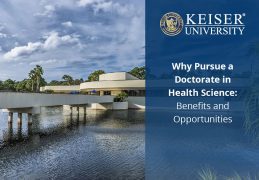The healthcare landscape is evolving at a record pace, with cutting-edge research and emerging technologies offering new and exciting ways to serve patients. Meanwhile, policy changes and even social movements promise to further accelerate the pace of change, shaping how healthcare is both delivered and experienced.
This dynamic environment is increasingly difficult to navigate from a professional perspective. Emerging opportunities have sparked an increasingly siloed and segmented approach to healthcare, in which specialized knowledge is prioritized. There is still a need for strategic leadership, and professionals can draw on diverse perspectives and experiences to shape the future of this quickly changing sector.
The Doctorate in Health Science (DHSc) plays into this effort, providing a reliable avenue for career advancement. Intended to prepare students for diverse healthcare leadership roles, the DHSc covers many concepts of value to future leaders: health informatics, community health promotion, global health systems and more.
You might be wondering, why pick a health science degree for advanced studies or is a DHSc worth it in today’s evolving healthcare industry? If you feel driven to make a difference, the DHSc could give you the tools, knowledge and confidence you need. However, this is a big decision, and it is natural to wonder which health science benefits can be uncovered with a DHSc.
A little insight can go a long way as you plan your career. Keep reading to discover the benefits of a health science degree and to help determine, is a DHSc worth it?
Is a DHSc Right for You?
The DHSc is a rigorous and career-driven program meant to inspire change in the healthcare industry. This program’s strength lies in its flexibility. Its unique curriculum can be designed to reflect the specific interests and experiences of diverse healthcare professionals. Diverse students may be well-versed in clinical or administrative practices but typically share a common desire to move into leadership roles.
There is no simple way to determine whether you are a strong candidate for the DHSc. This decision calls for a great deal of self-reflection. If you have a deep-seated passion for the healthcare field and the willingness to work hard and drive change, the DHSc could provide a strong start.
Ideal Candidates for the DHSc Program
Despite its versatility, the DHSc tends to attract specific types of individuals: accomplished healthcare professionals eager to continue advancing in their careers. Program candidates may express that they have big ideas for improving the field but currently lack the influence needed to get these plans off the ground.
These qualities apply to a wide range of potential students representing many healthcare niches and specialties. Examples might include:
- Healthcare administrators - Boasting experience in budgeting or scheduling, administrators might have inspiring ideas about streamlining workflows but may need additional education to ensure that these ambitious plans are seamlessly executed.
- Public health educator – Having already inspired individuals and entire communities to develop healthy habits, public health educators may hope to advance their messaging through policy development or by getting involved in large-scale health promotion initiatives.
- Clinical researcher – Drawing on advanced research skills, DHSc students with research expertise may hope to lead ambitious research projects or find new ways to leverage evidence-backed findings to promote desired policies or corporate initiatives.
- Nurses – Possessing extensive knowledge of healthcare processes, patient care experience, and leadership skills gained in their nursing roles, nurses are well-suited to transition into administrative positions via a healthcare administration degree.
These opportunities only scratch the surface. There are many ways to leverage a DHSc degree, so there is no simple way to explain, “Why study health science?” Ultimately, this decision comes down to leadership goals and a passion for driving change in the healthcare sector.
Comparing DHSc With Other Health Doctorates
The DHSc shares much in common with other health-oriented doctorate programs, including a clear emphasis on evidence-based research for addressing major healthcare sector concerns. Differences between degrees typically relate to research priorities and career specializations.
The Doctor of Philosophy (PhD) in Health Sciences covers similar concepts, but with a greater focus on academic research. PhD graduates prioritize original research and are most passionate about contributing to the growing health sciences body of knowledge. Meanwhile, the DHSc emphasizes applied knowledge and leadership skills. This degree also offers more opportunities for specialization, accommodating students who may bring a variety of goals and perspectives to the table.
Other doctoral degrees worth noting include the Doctor of Nursing Practice (DNP) and the Doctor of Public Health (DPH). Compared to the DHSc, these maintain a narrow focus, although they emphasize applied knowledge over scholarly research. The DHSc, however, is broadly applicable, helping many types of healthcare professionals advance in their careers. This degree is broadly applicable to professionals with administrative, clinical and allied health experience.
Benefits of a Doctorate in Health Science
Many potential DHSc students wonder, why pick a health science degree and why study at the doctoral level? This program, although less research-focused than the PhD in Health Sciences, remains quite intense, so it is important to identify desired outcomes prior to enrolling. The degree may offer more applied learning. The benefits of a health science degree extend beyond career advancement, fostering personal growth and impactful contributions to healthcare, to name a few. Some of these programs provide opportunities to directly apply your real-world work experiences and challenges to coursework, facilitating impactful and meaningful change within your field. You can often have tailored research to support your unique learning preferences. Aspiring healthcare leaders may find these additional advantages especially compelling:
Leadership Development
Mid-level healthcare professionals possess a wealth of clinical or administrative skills but may lack the training or experience needed to lead effectively. The DHSc can bridge this gap, offering a comprehensive foundation that covers management competencies and integrates evidence-based decision-making. Core coursework includes classes specifically dedicated to today’s top leadership and management approaches, revealing how these can be applied across numerous settings or scenarios.
Research Expertise
Although the DHSc is not as research-intense as the PhD in Health Sciences, this remains an evidence-based program. Through applied research, doctoral students discover practical tools for bridging the gap between understanding conceptual frameworks and implementing real-world programs or policies. Evidence-backed decision-making encourages future leaders to critically evaluate research and ensure that proposed policies or interventions are rooted in sound evidence.
Career Flexibility
The DHSc is a uniquely flexible degree program designed to help diverse students develop niche skills and knowledge, along with widely applicable leadership acumen. This degree opens the door to many high-level roles, including everything from research to leadership and even policy analysis or consulting. Equipped with this degree, graduates enjoy the credibility and transferable skills needed to plan their careers as they see fit.
High-Impact Roles
In the healthcare sector, climbing the career ladder means achieving broader influence. This, alone, makes the DHSc compelling. DHSc-driven leadership development can help remove career obstacles, allowing graduates to step into the field’s most influential roles, and, ultimately, advocate for systemic improvements. This far-reaching impact can lead to greater career satisfaction. Graduates take pride in knowing their hard work has made a genuine difference.
Influence on Policy
DHSc graduates are uniquely equipped to inspire change on a broader scale, often moving beyond specific healthcare organizations to influence state or federal regulations. Their deep understanding of health systems, sector-specific challenges and research-backed insights gives them the drive needed to tackle large-scale problems at the policy level.
Personal Growth Through a DHSc
For those wondering why study health science, the DHSc provides an excellent example of how this field combines academic knowledge with real-world impact. The DHSc facilitates both professional advancement and personal growth. While many aspiring leaders are driven by the desire for career advancement and broader industry influence, intrinsic values also matter.
Building Confidence as a Healthcare Leader
Confidence is crucial in all areas of the healthcare industry but becomes even more critical when ascending into leadership roles. Those who lead confidently can inspire similar passion in professionals across the spectrum of healthcare, empowering others to make difficult, but necessary decisions that produce positive patient outcomes. This confident approach to leadership can have ripple effects, encouraging healthcare professionals to step into their own roles with greater assurance.
The DHSc inspires confidence through leadership training and through the sheer respect that this degree commands. By the time they graduate, students recognize that they have achieved something awe-inspiring. They have completed rigorous, doctorate-level coursework and, along the way, developed invaluable skills.
Fostering Lifelong Learning and Intellectual Curiosity
The DHSc encourages students to explore complex concerns, drawing on cutting-edge research to address the healthcare sector’s most persistent challenges. Exposure to new ideas and perspectives sparks students’ curiosity, fueling a deep-seated passion for learning. Meanwhile, the DHSc helps students develop elite research skills, which can help them satisfy their newfound intellectual curiosity for years to come.
Developing Critical Thinking and Problem-Solving Skills
Critical thinking and problem-solving are crucial leadership skills, but they also can be difficult to develop. The DHSc overcomes this issue by actively encouraging students to evaluate information from many sources, using advanced tools and technologies as needed to aid in their in-depth analyses. Fascinating learning experiences help students apply critical thinking skills to real-world healthcare scenarios and consider how they might make informed decisions under pressure.
Emotional Rewards of Pursuing a DHSc
Although challenging, DHSc coursework can be personally gratifying. Doctoral students take great satisfaction in knowing that their hard work will make a genuine difference not only for specific patients and their families, but across the healthcare spectrum. Intense coursework also drives immediate emotional rewards. This means the joy of overcoming academic challenges and the deeper sense of pride that comes with knowing that personal efforts spark meaningful change.
Achieving Personal Fulfillment and Purpose
Personal fulfillment is built into the very structure of the DHSc program, which encourages students to draw on their unique goals and interests while aligning these with real-world healthcare challenges and opportunities. This lends students a deeper sense of purpose, making every course and learning experience feel that much more compelling.
Enhancing Patient and Community Outcomes
DHSc graduates make a marked difference in the healthcare industry. These passionate professionals have the skills and confidence needed to shape the field’s most impactful initiatives. Through business leadership, community advocacy or policy development, they help bring about systemic changes that can prove transformative across large populations of patients or community members.
Contributing to Meaningful Changes in Health Systems
Innovative ideas can drive powerful changes throughout the healthcare sector, but these can be difficult to develop or execute. The DHSc gives future healthcare leaders the practical tools and expertise needed to bring their ambitious visions to life.
Financial and Professional Benefits
The DHSc promises many deeply compelling personal advantages, but practical concerns such as wages and career advancement must also be considered. Here, the DHSc can be quite beneficial:
Long-Term Financial Growth Potential
Across the diverse spectrum of the healthcare sector, advanced degrees and credentials provide the most reliable opportunities for boosting earning potential. Several roles tied to the DHSc promise impressive wage growth. For example, the Bureau of Labor Statistics (BLS) reveals median annual wages of $110,680 for medical and health services managers. Across the spectrum of health science, leadership roles consistently deliver strong wages — and, due to current growth across the healthcare spectrum, these roles are expected to maintain a strong outlook.
Expanding Professional Opportunities
As a versatile degree, the DHSc can be tailored to help students pursue targeted professional goals. In the interim, this program’s core courses promote widely applicable leadership skills that can be leveraged across many specialties. Graduates should feel fully prepared to step into high-level administrative, academic or even policy-making positions.
Pursuing Your DHSc Online
As you plan the next step in your career, consider not only which type of health science degree you might pursue, but also how you will tackle potentially rigorous coursework. If you’re wondering, “why study health science“, online programs are worth considering because they expand access while still providing exceptional instruction. Online opportunities could be key to overcoming DHSc obstacles. Advantages of completing this program online include:
Flexibility and Accessibility in Online Programs
Many online DHSc students are already employed on a full-time basis, often holding entry or mid-level roles in the healthcare sector. These professional obligations could make it difficult to commit to traditional, in-person classes. Other potential students may struggle to commit to DHSc programs due to geographic limitations, especially if relocation is out of the question. Online programs provide the most reliable avenue to overcome these concerns without sacrificing the quality of instruction or access to learning tools and resources.
Balancing Work, Life and Education
Work-life balance is increasingly a priority among ambitious healthcare professionals, and while this can be difficult to achieve in today’s demanding workplace, it is even more challenging to foster when high-level coursework enters the mix. Online programs can help address these concerns by limiting the need for commuting and also making it easier to navigate potential scheduling conflicts.
Students are also pleased to discover that, while enrolled, they can promptly leverage DHSc-oriented skills in the workforce, leading to deeper concept mastery through the targeted integration of theory and practice. This can make both work and educational pursuits feel more meaningful and more rewarding, and boosting satisfaction in both arenas can actually help students strike a desirable balance between work and study.
Leading With Purpose: Elevate Your Healthcare Career With a DHSc
Ready to unlock powerful opportunities within the healthcare sector? The Doctorate in Health Science (DHSc) could be your ticket to a passion-driven career path. This program highlights many health science benefits, from leadership development to career flexibility. If you’re wondering, “is a DHSc worth it?”, consider how this degree can transform your career and help you make a lasting impact in healthcare.
Keiser offers many compelling graduate programs for health science professionals, including the DHSc, the Master of Business Administration in Health Services Administration (MBA HSA) and many others. Feel free to request more information — or get in touch to discuss your goals with a graduate admissions counselor.






 The instructors at Keiser University impacted my life. They believed in my ability to become a great graphic designer, regardless of how I felt about my skills. KU helped to prepare me for the real world and got me to where I am today.
The instructors at Keiser University impacted my life. They believed in my ability to become a great graphic designer, regardless of how I felt about my skills. KU helped to prepare me for the real world and got me to where I am today.
